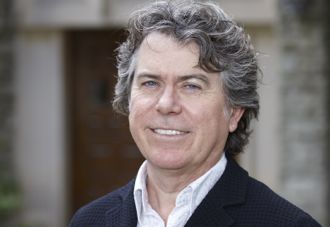SSHRC grant spurs Aboriginal treaties research
October 11, 2013
 Western Law professor Michael Coyle (pictured left), along with Prof. John Borrows from the University of Minnesota, co-chaired a national colloquium on the legal implications of historical treaty making in Canada. The daylong colloquium held on October 8 was sponsored by a grant received by Coyle from the Social Sciences & Humanities Research Council.
Western Law professor Michael Coyle (pictured left), along with Prof. John Borrows from the University of Minnesota, co-chaired a national colloquium on the legal implications of historical treaty making in Canada. The daylong colloquium held on October 8 was sponsored by a grant received by Coyle from the Social Sciences & Humanities Research Council.
The colloquium was held in conjunction with the Indigenous Bar Association conference, “Peace, Friendship & Respect: A Critical Examination of the Honour of the Crown on the 250th Anniversary of the Royal Proclamation and the Treaty of Niagara”.
The Royal Proclamation of 1763 and the resulting Treaty of Niagara is a foundational agreement in Canada’s constitution. The conference focused on various contemporary issues including the appropriate legal remedies for treaty implementation, the role of international law and indigenous legal traditions in relation to the development of treaty lands and resources, and the contemporary legal relationship between the Crown and Aboriginal peoples.
More than 130 academics, judges, lawyers and students attended the event.
“The colloquium was a wonderful opportunity for scholars ‘to test’ and receive feedback on new ideas about legal frameworks for treaty implementation,” notes Coyle. “I suspect that the final papers that come out of this conference will have a significant impact on the development of the law.”
Coyle’s SSHRC research grant work focuses on the Canadian courts’ lack of a coherent set of rules in relation to the ability of treaty signatories to hold each other to account for breaches of treaty promises. His work explores the possible normative foundations of a principled legal framework for the civil enforcement of treaties.
In particular, Coyle examines Aboriginal treaties as examples of a new institution of law intended to govern the interaction of Aboriginal and non-Aboriginal governments. The foundational premises of that new institution, Coyle argues, have certain necessary implications for the legal obligations created by treaties as well as the procedural framework within which treaty enforcement may be pursued.
Coyle’s SSHRC grant has allowed him to bring scholars such a John Borrows, Jean Leclair (University of Montreal), Sara Seck (Western Law), Mark Walters (Queens) and other leading scholars to discuss how the law might reimagine the remedies for breach of Crown-First Nation treaties.






